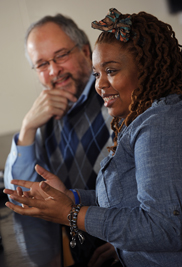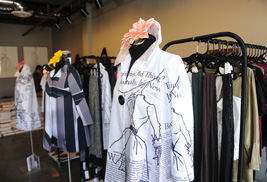Featured Article
The Kent State Fashion School Opens New Retail Space in Downtown Kent
The Kent State University Shannon Rodgers and Jerry Silverman School of Fashion Design and Merchandising has opened a new retail space The Fashion School Store. The store is located in the newly revitalized retail area known as Acorn Alley II in downtown Kent.
read morePut Your Money Where Your Heart Is: Achieving the Unimaginable
Posted April 9, 2012
Physics Professor Jon Secaur, Ph.D.,
dedicated his time to help aeronautics
major Deona Miller succeed in his class.
Secaur and Miller understand the struggles
students often go through while earning a
degree, so they encourage people to give
back to the university to help such students.
Physics Professor Jon Secaur, Ph.D., is every bit the scientist. His tiny office looks like it came right off the set of The Big Bang Theory, complete with a floating magnetic globe, an Einstein action figure and stacks of books with indecipherable titles. In contrast, Deona Miller (Aeronautics, ’12) is the picture of a modern college student: stylish, plugged in and focused. What brought them together one day at Smith Hall is a remarkable story of what giving is all about.
“I just can’t believe that I made it this far…”
The Republic of Cape Verde is an island country off the coast of Western Africa, spanning an archipelago of 10 islands. Tough economic times during the decades following its independence from Portugal in 1975 led many of its residents to migrate to Europe, the Americas and the African continent. At the age of four, Miller was one of those migrants.
“One of my earliest memories is when we were in New Jersey and it was cold! We were on the interstate, and I was in the back seat,” says Miller. “I didn’t remember roads like this in Cape Verde, there were so many lanes, so I asked, ‘Poppa, are we in a race?’”
Unfortunately, her parents did not find the dreams they were seeking in America. The years between Miller’s childhood and her teens were fraught with emotional and physical turmoil: her father’s imprisonment and death, her mother’s drug addiction and abuse in the home. Miller moved from place to place, living with friends or relatives, ultimately becoming a ward of the state. At 16, working and struggling to get through high school, she went before the court. “I told the judge I didn’t have the money to become emancipated. So I said, if I bring you proof of income, if I bring you my report card, will you please let me be out on my own? And he allowed it,” she says with amazement.
But her struggles didn’t end following her graduation from high school. “I had people around me basically saying just try and work, you don’t have the kind of support [you need] to go to college, and I didn’t even know if I wanted to go. [College] wasn’t part of the working world, and I never thought I would actually be able to go. But when I noticed that a lot of my peers were in school, I had a desire for more.”
While working as a 911 dispatcher at a police department in Virginia, Miller met a man who was a retired air traffic controller. He told her she worked so well under pressure that she should consider it as a career. “I didn’t even know what an air traffic controller was! So, I looked into it and saw that I could get a four-year degree and have a career afterwards. There are only about 20 schools in the country that offer the program [in aeronautics], and Kent State is one of the top three,” she says.
After she applied and was accepted to Kent State, she couldn’t afford to come and visit. “I didn’t even step foot on campus until it was time to go to class. That tells you a lot about how helpful everyone has been. When I came here I didn’t have any family or friends. I didn’t know anyone. It was totally different from anything I ever imagined. Sometimes I’d look around in my classes and wonder ‘What am I doing here?’”
It was in one of those classes that she met Secaur. Dedicated and ebullient, Miller stood out in his Physics I class. But after a few weeks, the professor noticed that she was missing from her usual spot in the front row of his classroom. Secaur sent her an email, and her response made everything clear. Between her schedule and some family issues she was having, Miller was in over her head. Secaur recalls, “Because she was taking the eight-week course, it gave us time to work together to get her grade back up. She came in early every Wednesday morning, and we’d go over each unit of material, and got her caught up on her homework.” Miller’s hard work under Secaur’s personal guidance paid off – Deona passed the course.
“When you see someone who needs help, just help them.”
Secaur’s life has been intertwined with Kent State for a long time. He received his undergraduate degree at Kent State. Secaur then taught at Roosevelt High School for 30 years, and part-time at the university while he obtained his master’s degree and Ph.D. Since retiring from the high school in 2007, he’s had a second career teaching full time at Kent.
“What excites me the most about teaching is when people light up when they understand something,” says Secaur. “Human beings are built to understand — not to memorize, but to understand. There’s a deep joy in understanding, and that shows up on people’s faces. That illumination, that sense of ‘getting it,’ is a wonderful thing.”
Secaur remembers how hard it was to put himself through school. “People like Deona — who are working three jobs, taking care of family and doing all the class work — it’s really very hard,” he says. “It makes me so mad when people talk about ‘what’s out there’ as being the real world, as if this is not real here. This is intensely real. When you’re a student, working all night and then coming to class in the morning, if that isn’t real I don’t know what is. It’s a hard life for students. So any help that we can give them, or provide equipment or materials, it makes their path a lot easier. That’s an obligation, to try to do the best we can in that way.”
What Secaur finds interesting about Miller is her resolve not to quit. “She’ll just keep going until she gets what she wants. She didn’t like the life she had; she wants something better than that.”
The financial aid Miller received has made a tremendous difference in her life at Kent State. “My first year, I didn’t really know about the resources available to me. I went to my advisor asking about books, because they were so expensive. I just didn’t have the money,” she says. “So he called me into his office one day and said he had some good news. He told me that I’d received an endowment [the Lillian Keller Endowment] to cover my books. I was just floored. I didn’t apply for anything, I didn’t ask. I’m so thankful. It helps so much.”
Miller understands very well how important it is to give back. “I want to be here, so to have the opportunity is awesome,” she says. “I want to be able to give students who don’t necessarily have the means a chance. I know how it is to want to do something, but you can’t because you have limitations. But giving back relieves some of those limitations. You never know how far a person can go. A lot of the time I just can’t believe that I’ve made it this far, but I know that I wouldn’t have been able to do it without help.”
At Kent State, The Last Dollar Scholarship Fund was created to provide support for students like Miller, who may experience circumstances that create an unanticipated need for additional financial support. Without such support, many students with emergency needs might not be able to remain enrolled and on track to earning their degrees. Please consider supporting The Last Dollar Scholarship Fund on your campus, or click here to learn about other ways to put your money where your heart is. Watch a video of Secaur and Miller speak about the student experience and giving at Kent State.
